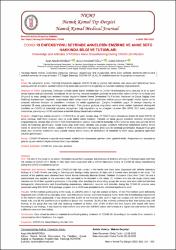| dc.contributor.author | Nalbantoğlu, Ayşin | |
| dc.contributor.author | Nalbantoğlu, Burçin | |
| dc.contributor.author | Gökçay, Gülbin | |
| dc.date.accessioned | 2022-05-11T14:37:10Z | |
| dc.date.available | 2022-05-11T14:37:10Z | |
| dc.date.issued | 2020 | |
| dc.identifier.issn | 2587-0262 | |
| dc.identifier.issn | 2587-0262 | |
| dc.identifier.uri | https://doi.org/10.37696/nkmj.779496 | |
| dc.identifier.uri | https://app.trdizin.gov.tr/makale/TkRFek1UTTJOZz09 | |
| dc.identifier.uri | https://hdl.handle.net/20.500.11776/8606 | |
| dc.description.abstract | Amaç: Bu çalışmanın amacı; Tekirdağ bölgesinde yaşayan COVID-19 aile içi yüksek riskli teması olan veya kesin laboratuvar tanısı konmuş emziren annelerin, pandemi döneminde anne sütü ve emzirme ile ilgili bilgi ve tutumları hakkında bilgi edinmektir.Materyal ve Metot: Çalışmada, Tekirdağ il sınırları içinde ikamet etmekte olan ve COVID-19 enfeksiyonu tanısı alan kişi ile ev içi yakın temas öyküsü olan ya da kendisi laboratuvar ile kanıtlanmış, minimal semptom gösteren ve evde tedavi edilen COVID-19 (+) hasta olan 30 gün-6 ay arası bebeği olan annelerin iletişim bilgilerine Namık Kemal Üniversitesi Tıp Fakültesi Hastanesi ve Çocuk Sağlığı İzlemPolikliniği kayıtlarından ulaşılarak, araştırmaya dahil olmayı kabul eden gönüllülere telefon yoluyla demografik verileri içeren ve bu süreçteki emzirme deneyim ve tutumlarını inceleyen bir anket uygulanmıştır. Çalışma kriterlerine uygun 31 anneye ulaşılmış ve bunlardan 28 anne çalışmaya katılmayı kabul etmiştir. Tüm çalışma grubuna ulaşıldıktan sonra anket verileri toplanarak demografik özellikleri ve COVID-19 sürecinde emzirme deneyimleri, bilgi kaynakları ve bu süreçteki tutumları IBM SPSS 20.0 paket programı kullanılarak işlenmiş ve p <0.05 istatistiksel anlamlılık düzeyi olarak kabul edilmiştir.Bulgular: Araştırmaya katılan annelerin 11'i (%39.3) ev içi yakın temaslı olup, 17 (%60.7) anne laboratuvar testleri ile kesin COVID-19 tanısı konmuş, hafif klinik bulguları olan ve evde tedavi edilen kişilerdir. Temaslı ve hasta grupta annelerin emzirme deneyimleri sorgulandığında, temaslı olan annelerin %54.5'inin bebeklerini sadece anne sütü ile beslediği, %36.4'ünün ise anne sütü yanında formül mama da kullandığı görülmüştür. Ancak hasta olup evde tedavi almakta olan grupta, annelerin %35.3'nün bebeklerini sadece formül mama ile beslemeyi tercih ettikleri, sadece %17.6'sının bebeklerini tek başına anne sütü ile beslediği görülmüştür. Bulgularımıza göre hasta olan annelerin bebeklerini daha yüksek oranda formül mama ile besledikleri ve bebekleri ile farklı odayı paylaşma eğiliminde oldukları görülmüştür.Sonuç: COVID-19 tedavisi sırasında emzirmenin sürdürülmesi konusunda gereken özen gösterilmelidir. Araştırmamızın sonuçlarına göre bu açıdan ailelerin bilgilendirilmesi önem taşımaktadır. | en_US |
| dc.description.abstract | Aim: The aim of this study is; to obtain information about the knowledge and attitudes of mothers who live in Tekirdağ region with high risk contact of COVID-19 in family or who have been diagnosed with a definite laboratory finding of COVID-19 about breastfeeding during the COVID-19 pandemic period. Materials and Methods: Mothers with COVID-19 high risk contact in the family and have been diagnosed with definite laboratory findings of COVID-19 who are living in Tekirdağ and having a baby between 30 days and 6 months were included in the study. The records of the patients were obtained from Namık Kemal University Medical School, Pediatric Outpatient Clinic Well Child Unit and a questionnaire was applied to the volunteers who accepted to be included in the study. 31 mothers who met the study criteria were reached and 28 of them agreed to participate in the study. After reaching the whole study group, the survey data were collected and their demographic characteristics and breastfeeding experiences, information sources and attitudes during the COVID-19 process were processed using IBM SPSS 20.0 package program and p <0.05 was accepted as the statistical significance level. Results: Of the mothers participating in the study, 11 (39.3%) were in high risk contact at home, 17 (60.7%) mothers were definitively diagnosed with COVID-19 by laboratory tests, had mild clinical findings and were treated at home. When the breastfeeding experiences of the mothers were questioned, it was observed that 54.5% of the mothers who were in high risk contact only fed their babies with breast milk, and 36.4% used formula in addition to breast milk. However, 35.3% of the mothers preferred to feed their babies only with formula, in the group that was sick and receiving treatment at home, only 17.6% of them fed their babies with breast milk alone. According to our findings, it was observed that mothers who were sick fed their babies with formula at a higher rate and tended to share a different room with their babies. Conclusion: Care should be taken to maintain breastfeeding during treatment for COVID-19. According to the results of our research, it is important to inform families in this regard. | en_US |
| dc.language.iso | tur | en_US |
| dc.identifier.doi | 10.37696/nkmj.779496 | |
| dc.rights | info:eu-repo/semantics/openAccess | en_US |
| dc.title | COVID-19 Enfeksiyonu Seyrinde Annelerin Emzirme ve Anne Sütü Hakkında Bilgi ve Tutumları | en_US |
| dc.title.alternative | Knowledge and Attitudes of Mothers About Breastfeeding During COVID-19 Infection | en_US |
| dc.type | article | en_US |
| dc.relation.ispartof | Namık Kemal Tıp Dergisi | en_US |
| dc.department | Fakülteler, Tıp Fakültesi, Dahili Tıp Bilimleri Bölümü, Çocuk Sağlığı ve Hastalıkları Ana Bilim Dalı | en_US |
| dc.identifier.volume | 8 | en_US |
| dc.identifier.issue | 3 | en_US |
| dc.identifier.startpage | 314 | en_US |
| dc.identifier.endpage | 320 | en_US |
| dc.institutionauthor | Nalbantoğlu, Ayşin | |
| dc.institutionauthor | Nalbantoğlu, Burçin | |
| dc.identifier.trdizinid | TkRFek1UTTJOZz09 | en_US |



















